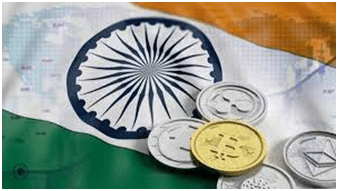CRYPTO IS LIKE PONZI SCHEME INDIA’S CENTRAL BANK WARNS
What is the news:
- In a strong warning to Prime Minister Narendra Modi’s government, a top official at India’s central bank reiterated concerns over cryptocurrency trading, likening the virtual coins to Ponzi schemes.
- Seeking a ban on cryptocurrencies, Reserve Bank of India Deputy Governor T. Rabi Sankar said the digital coins threaten “financial sovereignty” and “undermine financial integrity” of a country given that there are no underlying cash flows.
- We have also seen that cryptocurrencies are not amenable to definition as a currency, asset or commodity; they have no underlying cash flows, they have no intrinsic value; that they are akin to Ponzi schemes, and may even be worse,” Sankar said in a speech at a banking conference on Monday.
Important:
- So far, India has no regulation on crypto trading.
- The Supreme Court in March 2020 struck down a ban by the RBI and since then crypto investments have exploded in the country.
- An October report from Chainalysis, a crypto-analysis firm, found the Indian market grew 641% from July 2020 through June 2021.

- The timing of the sternly-worded speech can’t be overlooked. It follows the government’s announcementearlier this month of levying a capital gains tax on crypto trading, thereby officially acknowledging the virtual coins as assets. Soon after, RBI Governor Shaktikanta Das, a long-time opponent of cryptocurrencies, voiced his concerns over India’s financial stability from such volatile trades and said the digital coins have no underlying asset, “not even a tulip.”
- India has seen the second-highestadoption rate for cryptocurrency investments with millions jumping on the bandwagon. That has added to the RBI’s concerns over money laundering, terrorist funding and erosion of household savings.
- Cryptocurrency trading can “wreck the currency system, the monetary authority, the banking system, and in general, government’s ability to control the economy,” RBI’s Sankar said.
About Ponzi Scheme:
- A Ponzi schemeis a form of fraud that lures investors and pays profits to earlier investors with funds from more recent investors.
- The scheme leads victims to believe that profits are coming from legitimate business activity (e.g., product sales or successful investments), and they remain unaware that other investors are the source of funds.
- A Ponzi scheme can maintain the illusion of a sustainable business as long as new investors contribute new funds, and as long as most of the investors do not demand full repayment and still believe in the non-existent assets they are purported to own.
- Some of the first recorded incidents to meet the modern definition of Ponzi scheme were carried out from 1869 to 1872 by Adele Spitzeder in Germany and by Sarah Howe in the United States in the 1880s through the “Ladies’ Deposit”.
- Howe offered a solely female clientele an 8% monthly interest rate, and then stole the money that the women had invested. She was eventually discovered and served three years in prison.
- The Ponzi scheme was also previously described in novels; Charles Dickens’ 1844 novel Martin Chuzzlewit and his 1857 novel Little Dorrit both feature such a scheme.
- In the 1920s, Charles Ponzi carried out this scheme and became well known throughout the United States because of the huge amount of money that he took in.
- His original scheme was based on the legitimate arbitrage of international reply coupons for postage stamps, but he soon began diverting new investors’ money to make payments to earlier investors and to himself. Unlike earlier similar schemes, Ponzi’s gained considerable press coverage both within the United States and internationally both while it was being perpetrated and after it collapsed – this notoriety eventually led to the type of scheme being named after him.
How do Ponzi schemes affect the economy?
- A Ponzi scheme, like most frauds, increases money supply because both the schemer (correctly) and the victim (incorrectly) thinks he has the same dollars. However when Ponzi schemes collapse, that extra money disappears.
- Ponzi schemes often collapse during general economic downturns, because more people want to redeem than to invest. Therefore Ponzi schemes are bad monetary policy since they stimulate the economy during good times and repress it in bad, the opposite of usual central bank actions. Moreover they can erode confidence.
What is cryptocurrency? :
- A cryptocurrency (or “crypto”) is a digital currency that can be used to buy goods and services, but uses an online ledger with strong cryptography to secure online transactions. Much of the interest in these unregulated currencies is to trade for profit, with speculators at times driving prices skyward.
Advantages of cryptocurrency:
- Protection from inflation: Inflation has caused many currencies to urge their value to decline with time.
- Self-governed and managed
- Decentralized
- Cost-effective mode of transaction
- Currency exchanges finish smoothly
- Secure and private
- Easy transfer of funds.
Disadvantages of cryptocurrency:
- Illegal transactions
- Risk of Data Loss
- Power lies in few hands
- Buying NFTs with other tokens
- No refund or cancellation
- High consumption of Energy
- Vulnerable to hacks.
Subscribe
0 Comments





